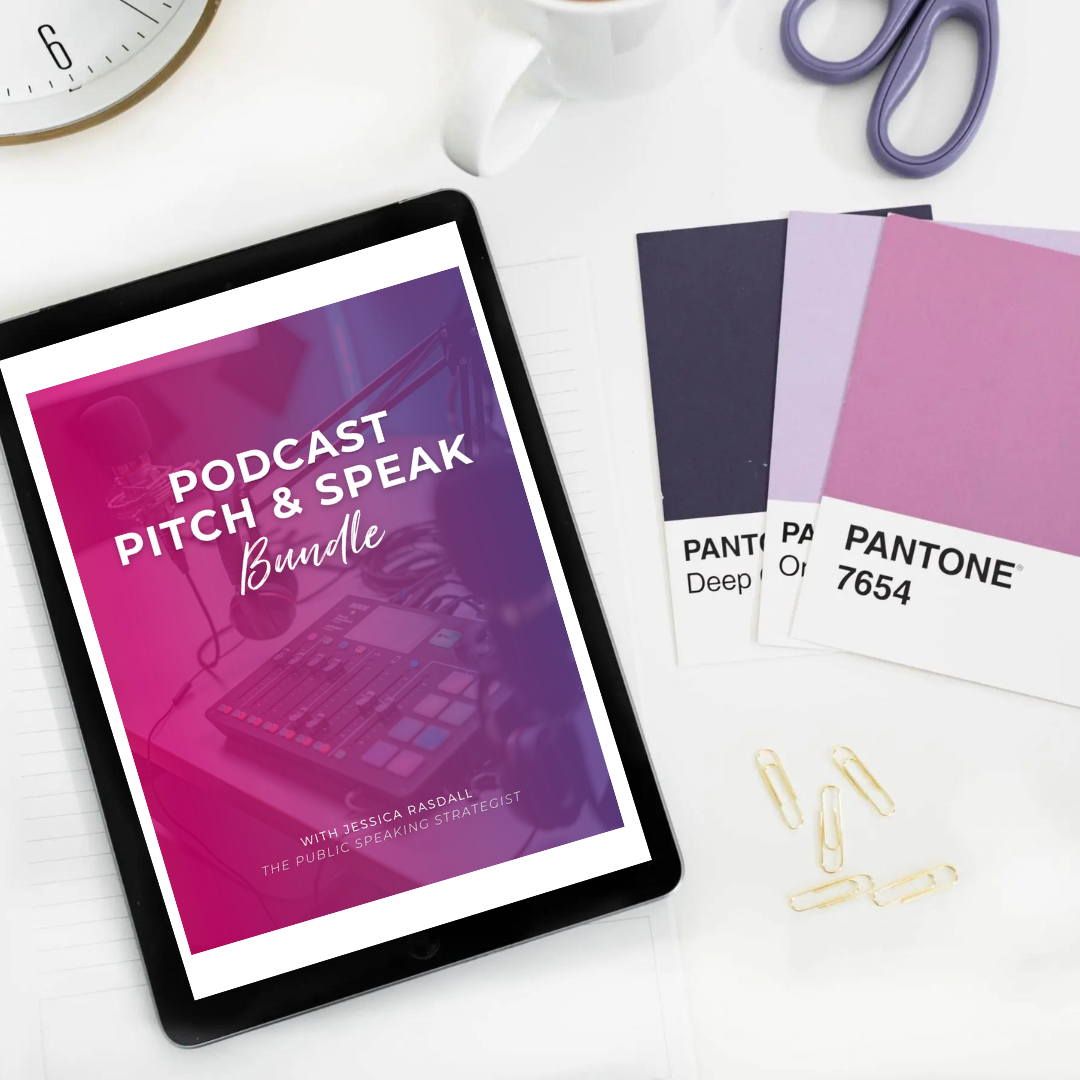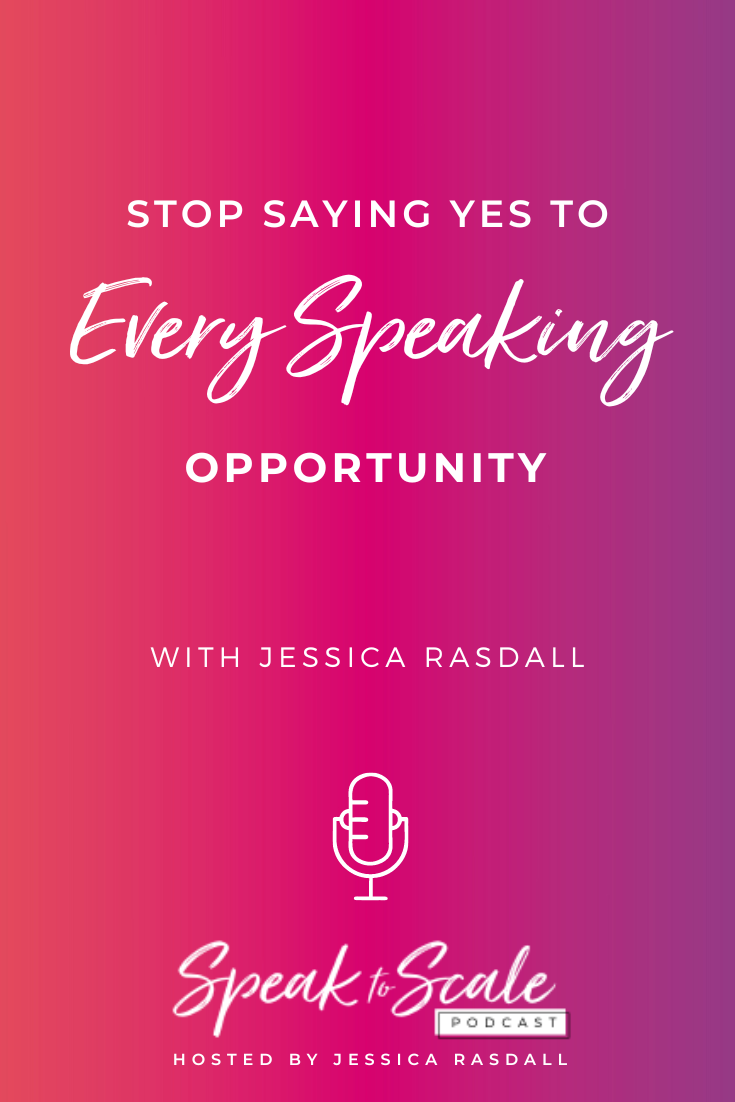230: Stop Saying Yes to Every Speaking Opportunity
There’s this misconception out there that a busy speaker is a successful speaker. You see someone booking all the podcast interviews, getting all the media attention, and speaking at all the events, and you think, “Dang, that speaker’s made it. They know what they’re doing!”
But that’s not always the case. Trust me, I work with some of these speakers. And so many of them come to me in a panic because they dropped tons of money booking these engagements and aren’t seeing results. Or they’re getting attention, but no sales or leads.
That’s what happens when you say yes to speaking opportunities that aren’t right for you. You can accomplish so much more by saying no! Let’s talk about what that means below.
If you loved this episode, I’d love for you to leave a review on iTunes and tell me about your biggest takeaway. Take a screenshot of you listening on your device, post it to your Instagram Stories, and tag me @jessicarasdall.
RESOURCES MENTIONED IN THIS EPISODE:
Which speaker path is best for your biz right now? Take the quiz!
It’s hard to say no
When you’re just starting out as a speaker, saying no sucks, to be honest. It’s scary. You don’t want to reject someone; what if they never invite you to another engagement again? What if this is the only speaking opportunity you’ll get, ever?
I promise you, more speaking opps will come your way! Don’t listen to the FOMO. It’s perfectly okay to say no. Actually, I recommend that you do.
Why? Because saying yes to every engagement, regardless of whether it fits your speaking strategy, will waste your time.
It wastes your time and money, because it won’t get you closer to your speaking goals. (More on that in a moment.) It wastes the audience’s time, because they’re expecting a speaker better suited to their needs.
Instead, target speaking opportunities with intention. Do less, and do them better. Think quality over quantity. And now I’m running out of ways to say this in different ways!
Two speaking engagements on the right topic, to the right audience, with a solid followup process will generate more sales and get more results than ten speaking engagements that weren’t a good fit in the first place. Guaranteed.
How to tell if a speaking opportunity is a good fit
Now that I’ve convinced you to say no more, how do you know when to say no to an engagement?
Look at your speaking goals
Say your top priority right now is to build brand awareness. You’re looking for more inquiries, requests, and referrals. You want to be that go-to speaker in your space. Look for opportunities that allow you to speak on your signature topics. That way, you can position yourself as an authority figure and become known as “that” expert speaker in your industry.
If your goal is to find more clients for your business, then focus on getting in front of the right audience. People who are ready to hear your message and take the action you want, whether that’s to convert or buy. Speaking to people outside of your target audience won’t move the needle in your biz.
Say yes to engagements that align with your audience, and don’t compromise. If the audience is unclear — which can happen with larger events and events with multiple audiences — give it a pass.
Finally, if you’re speaking to get paid (rather than make money through sales and conversions), find events that have the budget to pay you and let you serve the audience. Don’t say yes to an event that can’t pay your speaker fee; that just leads to resentment.
And don’t say yes to an engagement just for the paycheck and fail to deliver to the audience. That’s not cool.
Listen to your gut
Don’t ignore what your gut is telling you!
If the event lineup is weird or seems shady, say no. If the podcast host or event organizer is a jerk, don’t bother with them. Even if there’s something off about the speaking opportunity that you can’t really pinpoint, trust your instincts. Say no.
Target speaking opportunities with intention
Take it from me, friends: You don’t have to wait until things “slow down” to find the right speaking opportunities for you. Say yes now when it’s a good fit. Protect your energy, saving it for engagements that will propel you forward on your speaker path and scale your business.
Even if your work schedule is full, your client roster is bursting, and your personal life is nonstop chaos (in a good way), you can show up on stage and serve your audience without wasting your time and money.
Booking those strategic speaking opportunities starts from the very beginning with your pitches. A pitch is your chance to tell the host or event organizer what you can deliver, but also what you aim to gain out of it. And you have to choose the right opportunities to pitch if you’re going to speak with intention and strategy!
Meet our brand new resource in the Speak to Scale Shop that can help you pitch and book the right events: How to Speak on Podcasts!
With the How to Speak on Podcasts bundle, you’ll get tips, scripts, and trainings that’ll teach you how to scale your biz through podcasts.
You’ll learn:
How to choose the right podcasts to pitch
How to craft persuasive pitches that don’t sound too salesy
What the pitching process entails and how long it takes
How to prepare for your next podcast interview
What to do during the podcast so that listeners will remember you and take action
Loved this episode? follow us on Pinterest and pin it for later!
Other related episodes you’ll love
*Affiliate links may be included above. However, we only share resources with you that we personally use and love!












